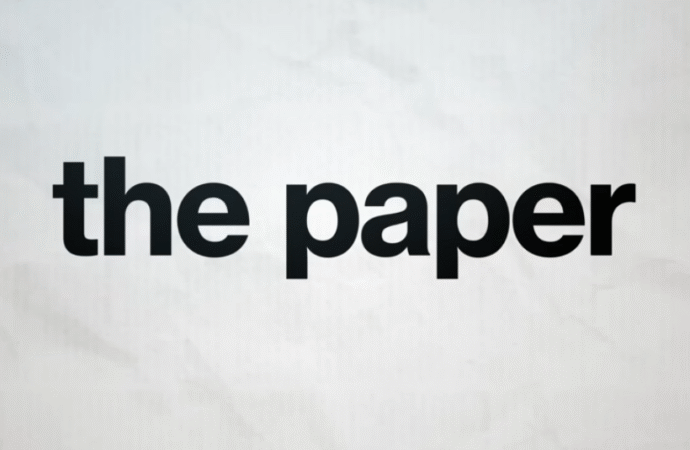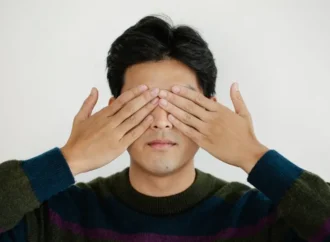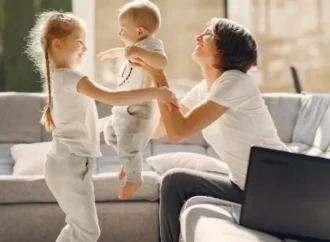When NBC announced a follow-up to their hit show “The Office” last January, the internet was skeptical.
“I don’t think this is a good idea,” one commenter wrote on Facebook after hearing the announcement. “A spinoff could ruin [The Office’s] legacy.”
I was skeptical, too. “The Office,” in many ways, feels unique – a creation of its time that can’t simply be copied and pasted into 2025. In fact, the refrain I hear most often when people talk about “The Office” is something akin to “this wouldn’t fly today.”
“The Paper,” which hit streaming on Peacock last week, had a tall task. It needed to be funny in the same way that “The Office” was, but in a culture where what can be laughed about has arguably shrunk quite considerably.
Somehow, “The Paper” pulls it off. Like “The Office,” it rides that line between culturally acceptable and dangerously out-of-bounds as closely as possible. Its characters are funny, their struggles relatable, and the hijinks just as insanely comedic.
There’s one aspect of “The Paper,” however, that is still a question mark for me – and it’s the one aspect of “The Office” that I think we overlook.
“The Office,” as funny as it was, was not simply a sitcom. It was, and continues to be, a shaper of culture.
Though we watched “The Office” for its laughs and its characters, what we got in tandem was an expectation of normal life. That was the whole point of “The Office,” wasn’t it? A look inside the normal life of the average American worker.
If you are normal, “The Office” tells us, your faith won’t impact your personal life, you’ll hold to an untraditional sexual ethic, and you’ll spend most of your days at work wasting time just hoping for 5 p.m.
These expectations might have had little predictive power on those already in the workforce when “The Office” was on the air. But for those of us who grew up watching it? The dynamics we saw of normal life bent us to believe that it would be abnormal for our faith to impact our personal lives in a meaningful way. We would be abnormal to hold to a traditional sexual ethic, to find purpose and value in our employment.
Sitcoms, perhaps more than any other type of entertainment, have this catechizing, culture-defining power.
The perhaps most dramatic example of this power comes from ABC’s “Modern Family.” When “Modern Family” premiered in 2009, less than half of Americans approved of same-sex marriage. By the time the show – which boasts a stable, relatable, and funny same-sex couple – ended in 2020, the approval rating for same-sex marriage climbed to 67% and the Supreme Court had made same-sex marriage legal throughout the nation. While this cannot completely be credited to “Modern Family,” the show’s normalizing effects are undeniable.
Will “The Paper” have such culture-defining power as “The Office” and “Modern Family”?
It might. Like sitcoms before it, “The Office” spinoff pushes the envelope on what its audience will accept as normal.
Two coworkers, for example, begin a sexual relationship that is explicitly anti-monogamous. Their relationship, we see, is fully centered on sexual gratification – we hear comments that they don’t even enjoy each other’s company, and they certainly don’t look out for each other’s best interest. In the last episode, they break up because one finds out that the other is not sexually active with someone else. This is, admittedly, partially played for laughs – though who can really know for sure?
Same-sex marriage, bisexuality, and asexuality all get mentions here, too, but mostly in passing.
Whether or not “The Paper” shapes our culture like sitcoms before it did is still a question mark. But what we do know is that it will not be neutral. “The Paper” doesn’t just want to make us laugh, it wants to create our expectation of reality. It wants to tell us what is normal.
And I’ll be the first to admit, I enjoyed “The Paper.” But if I’m not careful – if we’re not careful – we’ll find ourselves slowly starting to believe their version of reality and normalcy.
So perhaps the question isn’t whether “The Paper” will shape culture, but whether we will let it shape us.
—
The republication of this article is made possible by The Fred & Rheta Skelton Center for Cultural Renewal.
Image Credit: YouTube/Peacock
23 comments















23 Comments
Alaia Thomas
September 15, 2025, 11:48 amI have just received my 3rd payment order and $30,000 that I have built up on my laptop in a month through an online agent. This job is good and his regular salary is much better than my normal job.” Work now and start making money online yourself.
REPLYGo here……>>>>> https://Www.Homeprofit1.site
groger@Alaia Thomas
September 16, 2025, 7:05 amJOIN US Everybody can earn 250$/h + daily 1K !!! Start now making every month extra $6000-$22000 or more by just doing an easy online work from home. Last month i have earned and received $19650 from this work by giving this only 3 hrs a a day.Every person can now get this work and start earning online by.
REPLYFor details check ——-⫸ http://www.get.money63.com
harlotte Kay@groger
September 16, 2025, 11:12 amI get paid over $220 per hour working from home with 2 kids at home. i never thought i’d be able to do it but my best friend earns over 15k a month doing this and she convinced me to try. the potential with this is endless…,
COPY HERE➤➤ https://Www.EarnApp1.Com
REPLYYolonda Bass@harlotte Kay
September 16, 2025, 11:13 amStart making cash right now… Get more time with your family by doing jobs that only require for you to have a computer and an internet access and you can have that at your home. Start bringing up to $2700-$5700+Dollar per week . I've started this job and I've never been happier and now I am sharing it with you, so you can try it too. You can check it out here…
Here is I started_______ https://Www.HighProfit1.Com
REPLYFlorenceABowman@groger
September 17, 2025, 5:18 amI get paid more than $120 to $130 per hour for working online. I heard about this job 3 months ago and after joining this i have earned easily $15k from this without having online working skills. This is what I do…….Www.Works6.Com
REPLYLaw Assignment Writers@Alaia Thomas
September 17, 2025, 5:58 amThe article notes that media can shape public perceptions and identity. Curiously, Law Assignment Writers endeavor the same phenomena of influences, authority, and power of story telling in academic spaces to reflect the discussion in society at large.
REPLYJimbeau@Law Assignment Writers
September 17, 2025, 6:19 amI get paid over 220 Dollars per hour working from home with 2 kids at home. i never thought i’d be able to do it but my best friend earns over 15k a month doing this and she convinced me to try. it was all true and has totally changed my life. This is what I do, check it out by Visiting Following Website…
REPLY.
.
HERE—————⊃⫸ https://Www.Cash43.Com
Jimbeau@Law Assignment Writers
September 17, 2025, 6:20 amI get paid over 220 Dollars per hour working from home with 2 kids at home. i never thought i’d be able to do it but my best friend earns over 15k a month doing this and she convinced me to try. it was all true and has totally changed my life. This is what I do, check it out by Visiting Following Website…
REPLY.
.
HERE—————⊃⫸ https://Www.Cash43.Com
RSLewis@Law Assignment Writers
September 17, 2025, 6:20 amGoogle is now paying $300 to $500 per hour for doing work online work from home. Last paycheck of me said that $20537 from this easy and simple job. Its amazing and earns are awesome. No boss, full time freedom and earnings are in front of you. This job is just awesome. Every person can makes income online with google easily….
REPLY.
More Details For Us→→ http://Www.Payathome9.Com
PeterCKemp@Alaia Thomas
September 28, 2025, 5:25 amI get paid more than $120 to $130 per hour for working online. I heard about this job 3 months ago and after joining this i have earned easily $15k from this without having online working skills. This is what I do…….Www.Works6.Com
REPLYTilly Yusra
September 16, 2025, 10:11 amThis is a really simple method to keep making money. There are a lot of ways I can earn money from home➤➤ https://tinyurl.com/8zrdbynt
REPLYTonisha W. Heath
September 16, 2025, 1:30 pmEvery month start earning more than $12,000 by doing very simple Online job from home.i m doing this job in my part time i have earned and received $12429 last month .I am now a good Online earner and earns enough cash for my needs. Every person can get this Online
REPLYjob pop over here this site… https://Www.Worksprofit1.online
Debbie Arnold
September 16, 2025, 4:52 pmI am out here to speed this good news to the entire world on how I got help from Dr Kachi a great lottery spell caster that will help you cast a lottery spell and give you the rightful numbers to win the lottery, I didn't believe lottery spell at first but as life got harder i decided to give a try, I spend so much money on tickets just to make sure I win. until the day I met Dr KACHI online, which so many people have talked good about, that he is very great when it comes to casting lottery spell, he told me the necessary things to do and behold it was like a magic, i won $20 Million Dollars Florida Powerball Double Play with the numbers Dr Kachi gave to me. his a really trustful person worthy and reliable, i am sharing this to you who have been finding it so hard to win the lottery, Thanks you Dr. Kachi who helped me contact email [email protected] OR Text Number and Call: +1 (209) 893-8075 Visit his Website: https://drkachispellcaster.wixsite.com/my-site
REPLYGeena Presley
September 17, 2025, 4:29 amHome-based job that pays more than $2700-$4700+Dollar per week by doing simple tasks on a laptop or mobile device part-time. Last month, I earned $8400 Dollar from this job by working 4 hours per day online. Very simple jobs to do, and the earnings are insane. Everyone can now make more money online by joining the website listed below…..
Here is I started_______ https://Www.EarnApp1.Com
REPLY